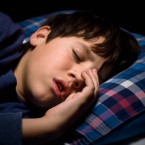A long overdue update to the American Academy of Pediatrics Recommendations was recently published specifically addressing the problem of childhood obstructive sleep apnea. This guideline discusses important symptoms for parents and physicians such as chronic snoring, mouth breathing, and pauses in breathing during sleep. But it also discusses less recognized features of sleep disorders such as inattentiveness and hyperactivity which can also result from disrupted sleep. Talk to your pediatrician if you suspect a sleep problem in your child. Dr. Susarla
AAP Recommendations for Childhood Sleep Disorders

Sleep disturbances, including obstructive sleep apneasyndrome (OSAS), are common in children and can result in significant health problems if left untreated.
In a revised clinical practice guideline, “Diagnosis and Management of Childhood Obstructive Sleep Apnea Syndrome,” published in the September 2012 Pediatrics (published online August 27), the American Academy of Pediatrics (AAP) recommends that all children or adolescents who snore regularly be screened for OSAS.
Additional symptoms can include labored breathing during sleep, disturbed sleep with frequent gasps, snorts or pauses, and daytime learning problems. It is important for children exhibiting signs of OSAS to get a comprehensive diagnosis by having an overnight, in-laboratory sleep study done.
If left untreated, OSAS can result in problems such as behavioral issues, cardiovascular problems, poor growth and developmental delays. Treatments are available that can result in significant improvements in these complications. Adenotonsillectomy is effective in treating OSAS and is recommended as the first line of therapy. Obesity can be a risk factor, so physicians may recommend weight loss in addition to other therapies in overweight or obese children. Post-operatively, physicians should be aware of the criteria suggesting which patients should be admitted and when other treatment should be considered, such as CPAP.
No comments:
Post a Comment